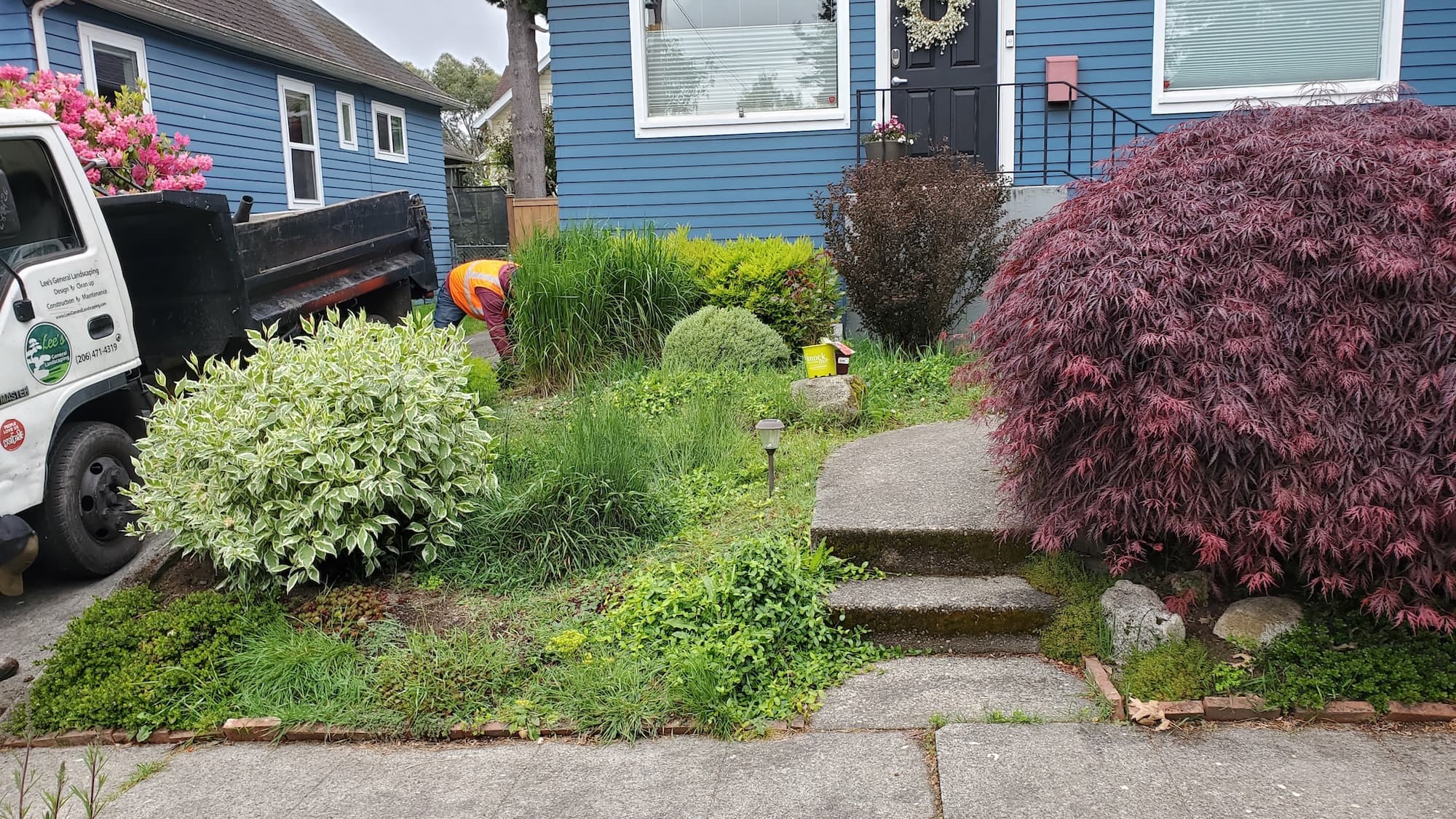West Seattle Quarterly Shrub Trimming Service
Homeowner’s Issue
West Seattle yards get a lot of things working against them: heavy fall and winter rain, summer dry spells, salty air near Alki, and deep shade around Lincoln Park and older conifers. Soils here trend toward compacted loam with glacially deposited cobbles in parts of the Admiral and High Point pockets; that means shallow topsoil in spots and poor surface drainage in others. Slopes and terraces are common, so shrubs that sit on berms or terraces can either drown in winter or bake in an exposed summer sun pocket.
That combination produces persistent moss, English ivy, and Himalayan blackberry pressure, plus seasonal weed flushes in spring and autumn. Overgrown hedges can block sight lines on narrow West Seattle streets and coat gutters with debris when shrubs overhang roofs. HOA rules and curb-appeal expectations in many neighborhoods push for tidy formal lines, but aggressive pruning at the wrong time causes stress and repeat work. Our approach is tuned to local rhythms: we trim for structure and airflow before wet seasons, mulch to moderate moisture swings, and avoid herbicides—relying on repeat hand removal, organic mulches, and targeted cultural fixes to keep plants healthy and neighbors happy.
Our Quality Service
We come in quarterly with a clear plan: assess, prune, tidy, and protect. Expect battery-powered trimmers for low noise, hand-pruners for precision, and a chipper for larger prunings when needed. We prioritize sustainable practices—no chemical herbicides, compostable mulches, and organic soil ammendments when appropriate.
Typical timelines: small front-yard jobs finish in 45–90 minutes; a full property with multiple beds and slopes usually takes 2–4 hours. Seasonal timing matters here—major structural pruning happens late winter to early spring, light shaping occurs summer and fall, and we leave flowering cycles intact where possible. We account for drainage, slope stability, and municipal water guidance during summer droughts to reduce repeat visits and water waste.
Benefits: safer sight lines, reduced pest/disease risk, cleaner gutters and walkways, stronger plant structure, and a lower-maintenance landscape that still reads neat from the street.
What’s Included
- Full assessment of shrubs, hedges, and access points.
- Pruning and shaping for health and form (hand-prune for roses and native shrubs; mechanical for larger hedges).
- Bed edging and manual weeding; ivy and blackberry removal handled by repeat pulls.
- Mulch refresh with compostable material to retain moisture and suppress weeds.
- Debris handling: chip on-site when possible, haul-away or curbside green‑bin option.
Options / Upgrades
- Mulch + weed‑fabric (for high-weed beds).
- Organic soil amendment and slow-release organic fertilizer.
- Native shrub replacement or planting for drought resilience.
- Stump grinding, light tree pruning, or seasonal clean-ups.
- Chip-and-leave vs. haul-away (green cart composting available).
Before & After / Expectations
Be honest: there will be noise and a pile of green material for a short time. We usually chip and scatter or load to the truck; if you prefer, we’ll sort for curbside green bin pickup. Access matters—gate widths and driveway space determine whether we can bring a chipper onto the property.
Post-service, beds look dramatically cleaner, but aggressive weed roots (ivy, blackberry) need follow-up pulls. Expect modest regrowth in spring; quarterly cadence keeps that manageable. Watering tips for West Seattle: water deeply in early morning during summer dry spells, avoid evening overwatering that encourages moss, and hold major pruning until after heavy dormancy where possible.
FAQs
Q: Will you use herbicides to kill ivy or blackberry?
A: No. We remove invasive growth by hand, repeated cutting, and smothering with mulch or fabric as needed.Q: How soon can you start after a quote?
A: We typically schedule within 1–3 weeks for quarterly work; smaller touch-ups can be sooner if weather and access allow.Q: Do you chip on-site or haul everything away?
A: Both. We chip on-site when safe and space allows, or we haul to compost/green bin per your preference.Q: Do you handle steep slopes or terraces?
A: Yes. We plan for slope stability, avoid heavy equipment on steep banks, and recommend plant choices that reduce erosion.
Call to Action
If you live in West Seattle and want a garden that behaves—clean lines, healthier shrubs, less work—book a free estimate. We move fast on scheduling, work sustainably, and know the neighborhood quirks from Alki to Admiral. Email neatandtidyseattle@gmail.com or call 206-538-9344 to get straighter hedges and less yard drama. Licensed • Bonded • Insured










